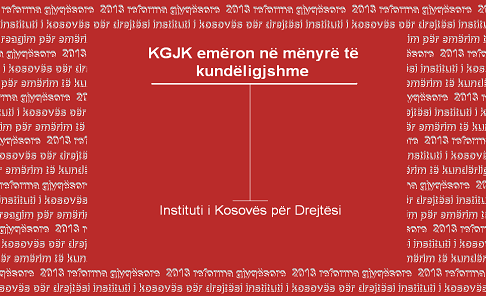November 21, 2012 – Kosovo Law Institute (KLI) joins concerns raised about the approach of the Kosovo Judicial Council (KJC) in the process of appointing the Presidents of Basic Courts. On November 21, 2012, the KJC has violated the legal criteria for appointing the President of the Basic Court in Pristina.
In this position, the KJC has appointed a judge who has only an initial mandate and no permanent mandate. It is illogical to elect a candidate for President with a four (4) year mandate as long as his mandate has been initiated for three (3) years, where its re-appointment for a permanent mandate can be considered next year. Also, the mentioned candidate does not have the managerial experience required for this position, where the Guidelines for the Appointment of Court Presidents and Supervisory Judges clearly state that “The KJC will select the presidents of the basic courts based on proven leadership abilities, taking into account leadership experience in environment that are similar to the complexity and other challenges faced by the president of the basic court for which the selection will be made”. We hope that the KJC has analyzed and understood the role and importance of the Basic Court in Pristina.
However, we feel obliged to emphasize that the decision of the KJC makes us worry about the treatment that this court has had since the beginning. The Basic Court of Pristina will be the largest court in the country, with exclusive competencies in several areas, and represents the institution which will be an overview of the entire judiciary in the country. It is unjustified that the KJC ranks in favor of certain interests by making open legal violations for certain appointments that would go to the detriment of this court and justice in the country.
This action of the KJC is not isolated as such, and will have consequences in the future, but will have immediate negative effects on the credibility of the citizens. The current judicial reform has been welcomed by citizens, where public opinion polls indicate the increase of citizen’s credibility in the courts. However, this KJC action undermines efforts to increase citizens’ confidence in the current judicial reform. At the same time, the KJC action adds voices to the misuse of independence in decision making of the judiciary. The KJC should clearly understand that despite the independence, this institution should be accountable for the actions of the Council and the judiciary.
At any moment, the judiciary should not be considered as private property, because judicial independence is not an end in itself but aims to ensure that the rights and freedoms of individuals are realized, implemented and protected by independent and impartial judges. In the latest report, the KLI has warned that the greatest risk lies in that in countries where the judiciary is controlled by the executive or where corruption is systematic, The Judicial Council may become an obstacle and does not contribute to the independence and accountability of the judiciary.
Therefore, this situation created at the end of the appointments of Presidents as foreseen by the new Law on Courts at least contributes to the genuine transition and the creation of conditions for a successful initiative in the implementation of the law on Courts and reforms in Justice. KLI suggests that the KJC convenes and re-examine the decision taken in violation of the legal and constitutional provisions by making the President’s selection fully based on laws and fairness.

